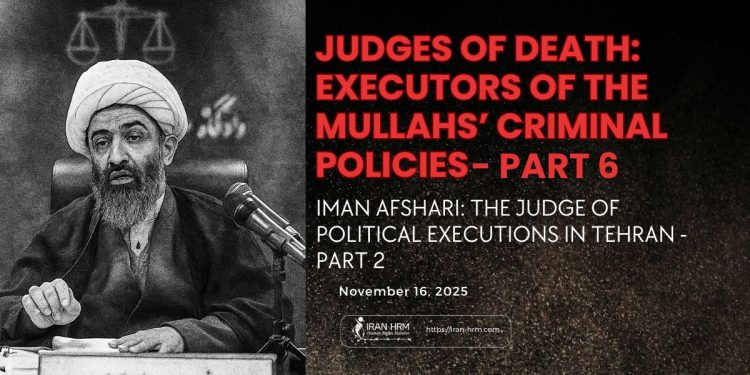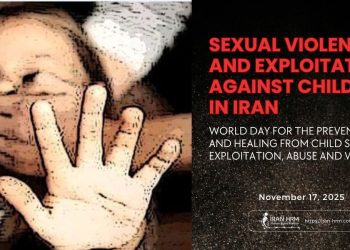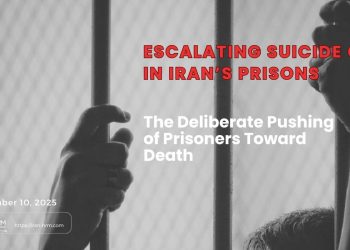In the previous issue of “Judges of Death,” we examined the conduct of Iman Afshari in political executions, heavy sentences against protesting women, and his role in the organized elimination of opponents. In continuation, this report turns to the less visible layers of his record—layers that show how the behavioral patterns of these judges of death, including Afshari, reveal repression not as an isolated occurrence but as a deliberate and fully institutionalized mechanism within the judiciary. This section exposes the ideological, religious, and legal dimensions of his actions and provides a clearer picture of his position within the structure of repression.
Ideological Repression and Persecution of Religious Minorities
Iman Afshari has systematically violated freedom of religion and conscience. In dozens of cases involving Bahá’í and Christian citizens, he has labeled religious activity as “actions against national security” and issued heavy sentences.
In one case, seven Christian citizens were collectively sentenced to a total of 32 years in prison solely for holding a house-church gathering. In another case, Mahvash Sabet-Shahriari and Fariba Kamalabadi, two leaders of the Bahá’í community, were each sentenced to 10 years in prison without access to an independent lawyer. These brief and degrading hearings constitute a clear violation of Article 18 of the International Covenant on Civil and Political Rights.
Ideological Justifications and Judicial Alignment with the Policy of Repression
Since Judge Afshari has never publicly commented on the reasons behind his rulings, it is the official discourse of the regime that effectively speaks on his behalf. To justify such rulings, the regime frames everything around “fighting the enemy” and “protecting national security.” Within this framework, charges such as baghi are portrayed as legitimate, and political activity or support for the opposition is recast as “terrorist acts” or “armed operations” to rationalize the heavy sentences issued.
The issuance of death sentences against supporters of the People’s Mojahedin Organization of Iran clearly demonstrates the judiciary’s complete alignment with the regime’s broader political strategy. These rulings are issued precisely in line with the publicly declared position of the highest authorities—aimed at creating fear, preventing popular uprisings, and ensuring the survival of the system of Velayat-e Faqih. Within this structure, Judge Afshari serves merely as the judicial executor of this fear-producing policy.
Afshari’s central role in handing down the harshest and most repressive sentences—without facing the slightest internal criticism or review, and even receiving professional advancement—reveals the absolute immunity granted to Revolutionary Court judges. This systemic immunity enables him to continue widespread and persistent human rights violations without any concern for legal or institutional consequences.
Systematic Human Rights Violations in the Conduct of Iman Afshari
An examination of Iman Afshari’s record shows that the rulings he issues are in clear violation of human rights principles and international covenants.
- Article 6 of the International Covenant on Civil and Political Rights (Right to Life):
The widespread issuance of death sentences for political and religious prisoners by Afshari constitutes a direct violation of this article, which guarantees the fundamental right to life. - Article 7 (Prohibition of Torture and Cruel, Inhuman or Degrading Treatment):
Keeping prisoners in prolonged uncertainty, extended solitary confinement, and handing down sentences accompanied by humiliation and insults are clear examples of psychological and “white torture.” - Article 9 (Right to Liberty and Personal Security):
Many defendants under his jurisdiction have been sentenced to long prison terms without any legal justification, based on fabricated security charges and arbitrary arrests. - Article 14 (Right to a Fair Trial):
Short court sessions, denial of access to independent counsel, and relying solely on intelligence reports instead of examining evidence constitute a blatant violation of this article. - Article 18 (Freedom of Thought, Conscience, and Religion):
The issuance of harsh sentences against Bahá’ís, Christians, and other religious minorities demonstrates the violation of their right to freedom of religion and belief. - Article 19 (Freedom of Expression):
The conviction of journalists and artists such as Mohammad Rasoulof or Nazila Maroufian for expressing views or conducting cultural work is a clear violation of this article. - Articles 21 and 22 (Freedom of Assembly and Association):
The severe repression of teachers, workers, and labor activists, along with heavy sentences issued for peaceful union activities, is a striking example of violations of these articles.
Iman Afshari represents a judiciary that, instead of administering justice, functions as an instrument of repression. His rulings against artists, teachers, women, religious minorities, street protesters, and even soldiers demonstrate that no social group is safe from the reach of this machinery of suppression.
The people of Iran will not forget figures like him. Just as history preserves the names of perpetrators in the collective memory, the name of Iman Afshari will remain alongside other agents of repression—until the day he is held accountable before independent and international courts for his injustices and deadly rulings.
The list of Judge Iman Afshari’s crimes is endless.
Following the publication of documents and testimonies, international human rights bodies called for his prosecution and targeted sanctions. UN Special Rapporteurs on Iran stressed the necessity of establishing a mechanism to investigate the role of judges in the repression of protesters. Amnesty International described the rulings of Branch 26 as acts of “judicial killing,” and in the European Parliament, Afshari’s name was raised for inclusion on the list of targeted sanctions.
Call to Action for Relevant Bodies and the International Community
Iman Afshari is a prime example of judges who have turned justice into an instrument of repression. He is the executor of the security-driven will of a regime that seeks survival through elimination, execution, and intimidation. His record of death sentences and prison terms against protesters, women, religious minorities, and artists stands as clear evidence of systematic judicial killing in today’s Iran.
The courts he presides over are a continuation of the same apparatus of repression that has operated under the guise of law since the 1980s. The international community must put an end to this cycle of impunity. UN bodies, the European Union, and governments committed to human rights must take urgent action:
- Placing Iman Afshari on targeted sanctions lists,
- Launching independent investigations into his rulings and his role in the torture and execution of prisoners,
- Providing concrete support to political prisoners and to the families of victims who are standing up to this machinery.
Denying prisoners—especially political and religious prisoners—access to medical treatment in Iranian prisons is a deliberate and systematic practice designed to break their resistance through suffering and the gradual destruction of their physical and psychological well-being. Iman Afshari is one of the central figures in this cycle of abuse—a cycle that will continue until the day of accountability before the free courts of the people of Iran.







